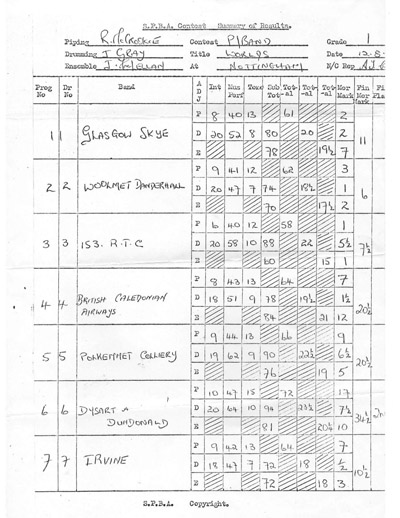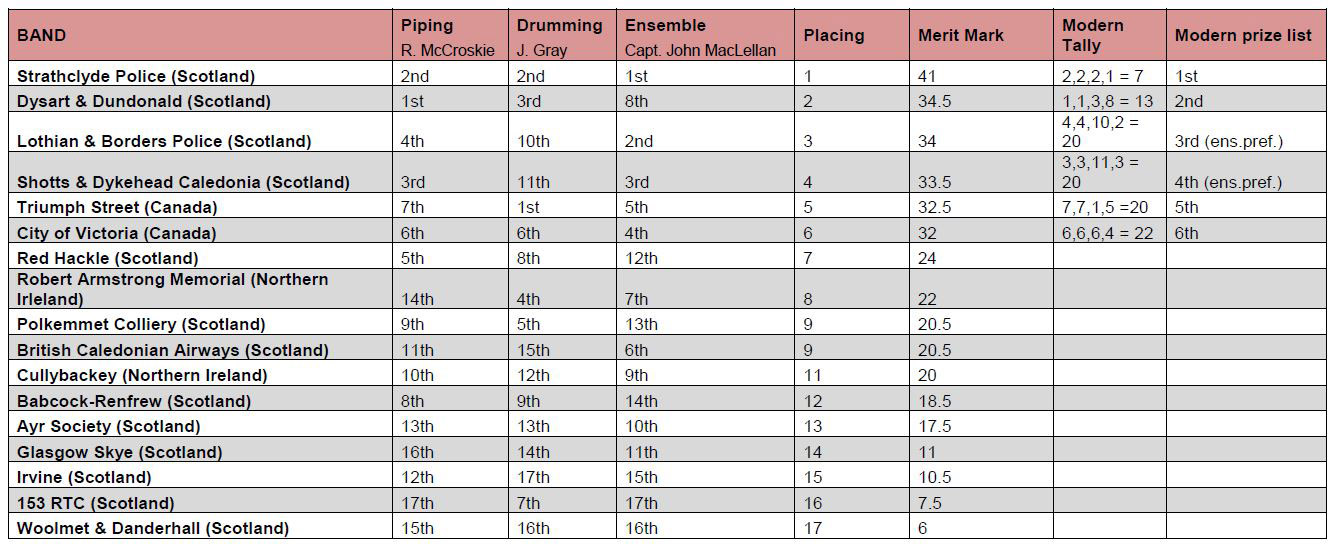World’s 1979 summary sheets
![City of Victoria marching to the competition circle at the 1979 World Pipe Band Championships. [Photo Allan Skalazub]](https://www.pipesdrums.com/storage/2019/07/Worlds1979_CityofVictoria_01_home.jpg)
pipes|drums has secured the original (not yet “Royal”) Scottish Pipe Band Association summary sheets, and they are a fascinating look into the methods used to determine results.
While 1979 World’s was a two-day affair, the 17 Grade 1 bands only played on one day, Saturday, August 11. Further, they played only one event, a medley competition, with contestants submitting two selection and drawing one at the line to play in the contest.
Forty years ago, there were only three judges: one piping, one drumming and one ensemble. A second piping judge would not be added until the early 1980s, when the RSPBA created a more equitable approach, opened up its coffers and hired a second judge for all majors.
The judges for the Grade 1 competition were Robert McCroskie (piping), James Gray (drumming), and Captain John MacLellan (ensemble).
How were results tabulated? It was a complicated system, and one that yielded great power to the piping and ensemble judges.
Piping was judged out of 75 points. Drumming and ensemble were judged out of 100. So, each judge would give the band a score based on those maximums.
That’s straightforward, but it gets complicated.
At the 1979 event, the highest score for piping was awarded 17 “merit marks” (because there were 17 competitors). The lowest score was awarded one merit mark. The same system was used for ensemble.
For drumming, the highest score was awarded 8.5 merit marks. The lowest was awarded .5 merit marks, meaning that piping and ensemble each counted twice as much as drumming.
Placings were determined by adding together the three merit marks and the highest score won the contest.
So, at the 1979 World’s, the highest possible “merit mark” would have been 42.5 (17 + 17 + 8.5).
Here are the original hand-written SPBA summary sheets. Just click on the image to open the full three-page pdf.

Note that the piping judge assigns points in three specific categories: Introduction (maximum 10 points), Musical Performance (max. 50), and Tone (max. 15).
The drumming judge had the same categories, but with 20 points maximum for Introduction, 70 points maximum for Musical Performance, and 10 maximum for Tone
The ensemble judge simply gave one mark with a maximum of 100.
Today’s judges simply give every band one ranking number, with no overall points, much less categories broken out.
That’s pretty hard to read, so below is a transcription of the final tallies, with bands in their finishing order.
How does such a system compare with the much more basic approach of today, in which each of the four judges simply ranks bands, and the rankings are tallied together with equal weighting?
If we double the piping rankings from 1979, assuming they would be identical from two judges (highly unlikely, but what else can we do?), the hypothetical modern-day results are in the far-right column.
Interestingly, the top-six prize list remains the same.
We can also see the impact that the ensemble judge, John MacLellan, had. MacLellan placed the reigning World Champions Dysart & Dundonald eighth in ensemble. With that, he pretty much put paid to their chances of a third successive World title, and indeed the band took second.
MacLellan was one of the greatest pipers in history, and a revered figure around the world. But he had not been a pipe bandsman at the Grade 1 competition level. He and others from the solo piping world, like Seumas MacNeill and John MacFadyen, routinely judged pipe band competitions.
They called it like they heard it, and evidently judged with an ear towards solo piping standards. That, after all, made sense if we accept that the essential goal of a pipe section is to sound like one big bagpipe – at least without harmonies. Ensemble judging was a whole different beast.
The last pipe band competition that MacLellan judged in the UK was Grade 1 at the 1983 World Championships, when he placed the 78th Fraser Highlanders of Canada first in ensemble.
We can also see that drumming judge Gray absolutely buried Shotts & Dykehead Caledonia with an eleventh. Remember, this was Shotts with Lead-Drummer Alex Duthart. Duthart was with Shotts until 1982, when he joined the Grade 1 British Caledonian Airways.
In 1979, the Shotts corps were the reigning World Pipe Band Drumming Champions.
We don’t know if a Shotts drummer dropped a stick, burst a drum head, or urinated in Gray’s Weetabix that morning, but if Gray was not a fan of Duthart and/or his drum section, then it perhaps carried over to City of Victoria. That corps was led by Duthart disciple John Fisher, who had just come out of a stint as a member of Shotts. Gray placed Victoria sixth in drumming – not terrible, but usually not enough to carry a band to a first prize.
Apart from that, if politics were involved with any Canadian bands’ results, the judges’ decisions don’t really support it.
According to results, City of Victoria was not robbed of a World’s win, as some at the time contended. The band placed sixth in piping, sixth in drumming and fourth in ensemble. Triumph Street was seventh in piping, first in drumming and fifth in ensemble. Fisher admitted that his City of Victoria corps did not perform up to their standard.
If City of Victoria was the victim of politics, then the results suggest that all three judges must have been in collusion.
Our thanks again to former Triumph Street piper Allan Skalazub for his assistance with this piece.
Related articles
 Triumphant and Victorious – 1979 a historic World’s, 40 years later
Triumphant and Victorious – 1979 a historic World’s, 40 years later
July 24, 2019
 Should associations provide a public summary of their judges’ competitive playing experience?
Should associations provide a public summary of their judges’ competitive playing experience?
May 8, 2018
 RSPBA finally confirms Grade 1 World’s format
RSPBA finally confirms Grade 1 World’s format
July 9, 2019


I have a recording of the 1979 contest and as I remember, it supports the result for the Canadian bands. I also have a recording from WPBC 1981. Pipingwise COV must have been very close to the top. They were the most impressive band on the day.
An analogy to the sometimes strange drumming results is seen by the Spanish football club FC Barcelona. As a top of the shelve team, we expect them to perform like a tight unit but now and again, even in the biggest tournaments, they play uninspired and with obvious mistakes. The only difference from a music competition is that the result is produced by the number of goals scored during the match thus making the low par performance obvious to everybody. Imagine taking the goals out of a football match and decide a winner. That’s what pipe band judges do every Saturday.